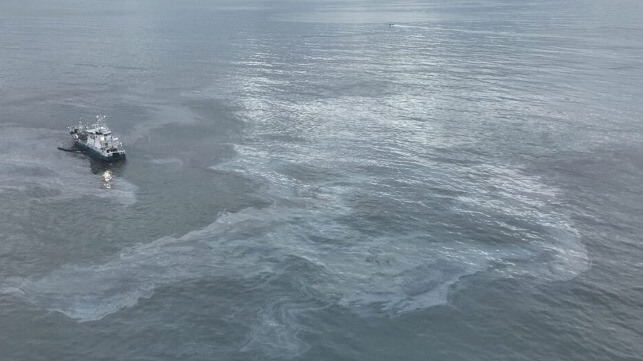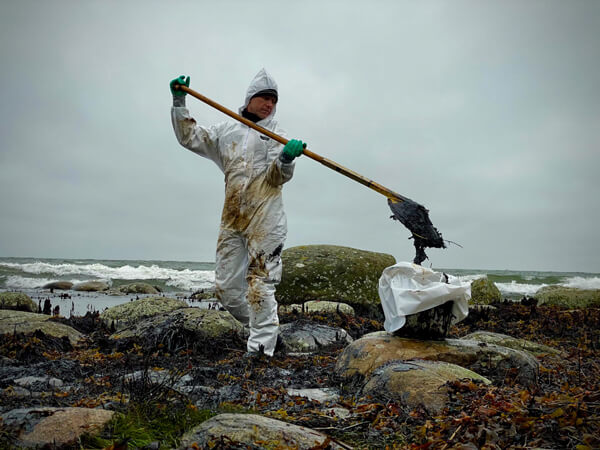Grounded Ferry Marco Polo Shifts in Bad Weather Releasing More Oil

Salvage teams were forced to evacuate the grounded ferry Marco Polo (15,955 gross tons) after the vessel began moving in bad weather and rough seas on Sunday on the coast of Sweden. While the ferry eventually became stuck for a third time, the release of oil from the damaged fuel tank increased creating a worsening environmental situation.
The ferry had been aground for a week in the Baltic along the southeast coast of Sweden near the small island of Hanö, but shortly after noon on October 29, they determined the vessel was again moving due to the worsening weather conditions. According to the Coast Guard, the ferry slipped off the ground while TT-Lines confirmed that the salvage master ordered all non-essential personnel off the vessel. They are reporting by 14:30 the Marco Polo had stopped moving but the vessel had shifted further offshore.
Efforts had begun the previous day to remove the fuel from the grounded vessel in a salvage operation being undertaken by SMIT. The shallow draft bunker vessel Tresfjord went alongside the Marco Polo on Saturday and they were beginning the efforts to pump fuel from the damaged tank which contained 163 cubic meters of oil at the time of the casualty. The Coast Guard can not confirm the amount of oil that has leaked, but as of Sunday, they were saying 30 cubic meters of oil and oil waste had been recovered from the water and coastline. They believe additional amounts remain under the water’s surface and the damaged tank is continuing to leak while the pumping operation was suspended due to the weather. Another undamaged tank holds a further 300 cubic meters of fuel.
The Swedish Coast Guard is reporting a large new oil slick around the vessel on Monday saying the Sunday’s high swell “dramatically changed the cleanup situation.” Several vessels are in place to pick up the oil at sea and Coast Guard aircraft are mapping the area in search of additional oil. As of midday on Monday, they reported that one Coast Guard vessel had recovered about three cubic meters of oil. They are also reporting that the oil crossed Pukavik Bay and has come ashore in a second location near the small town of Norje. Previously, they have reported that at least three miles of the coastline have been fouled by the oil.

Members of the Home Guard and coast guard trainees joined the cleanup operation over the weekend (Swedish Coastguard photos)
The salvage operation was also set back because of the weather on the weekend. TT-Line reports that SMIT had submitted a salvage plan to the Swedish authorities which was being reviewed on Saturday before the vessel shifted. The line says there is now a high priority on refloating the vessel. However, the salvage team was now required to send down divers to reinspect the situation. A survey is underway to determine the depths and shapes of underwater terrain around the grounded vessel.
“We are aware of the impact the incident has caused and we are taking the case very seriously - now and after the completion of the case,” TT-Line wrote in its statement. They said the priority has become recovery of the vessel to reduce additional contamination and mitigate the impact.

that matters most
Get the latest maritime news delivered to your inbox daily.
Sweden last week fined the captain and third officer for what it believed was negligent navigation which contributed to the grounding. They said the officers both had only been using the ship’s electronic chart and not employing other resources despite it being nighttime and there was fog. They believe the electronic navigation system malfunctioned taking the ferry significantly off course. The ferry touched bottom but continued sailing before becoming stuck during a second grounding.
Under Swedish law, the Coast Guard can also impose a fine for the cleanup operation. Media reports said they are also investigating the seaworthiness of the ferry and the suspected malfunction of its systems. Before this weekend’s further release of oil, a local elected official had warned the cleanup could take a year.
